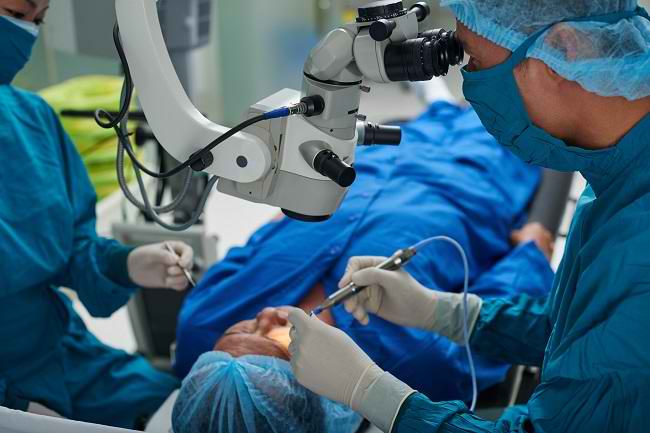Moebius syndrome is an inherited disorder characterized by weakness or paralysis of the functioning facial nerves for controls facial expressions, eye movements, speech, chewing, and swallowing. Congenital neurological disorders are classified as rare or rare.
Moebius syndrome or Moebius syndrome can be detected from birth. The exact cause of Moebius syndrome is not known. However, genetic and environmental factors are thought to influence the occurrence of this condition.

Causes of Moebius Syndrome
The exact cause of Moebius syndrome is not known. Most cases of Moebius syndrome occur randomly and can happen to anyone. Moebius syndrome is a rare inherited disorder, which can occur in 1 in 50,000 or 1 in 500,000 births.
Moebius syndrome occurs due to not formed or the wrong development of cranial nerves VI and VII. In a minority of cases, underdevelopment of cranial nerve XII can also accompany this condition. Researchers suspect this error or failure of cranial nerve development occurs due to disruption of blood flow to the fetal brain stem during development.
Although it occurs randomly, researchers suspect that there are several factors and conditions that can increase the risk of Moebius syndrome, namely:
- Genetic disorders, especially on chromosomes 3, 10, and 13
- Medical conditions during fetal development, such as hypoxia and ischemia
- Cocaine use during pregnancy
Symptoms of Moebius Syndrome
Symptoms of Moebius syndrome can be seen when a new baby is born. Symptoms that arise can be very diverse and can differ from one patient to another. However, some of the most common symptoms are:
- Absence of facial expressions, such as not being able to smile, closing eyes, raising eyebrows, and frowning
- Weakness or complete paralysis of facial muscles
- Crossed eyes (strabismus)
- Small chin or jaw and small mouth
- Cleft palate
- Disorders of the hands and feet, such as clubfoot and missing or fused fingers (syndactyly)
In addition, there are a number of other symptoms that appear when someone has Moebius syndrome, namely:
- Difficulty chewing, sucking, or swallowing
- Difficulty speaking
- Frequent drooling
- Hearing disorders
- Disorders of the teeth
- Dry eyes
- Delay in the development of motor skills
When to go to the doctor
Symptoms of Moebius syndrome can generally be seen since the baby is born. If you do not give birth at the doctor, do an examination to the doctor immediately if your child has the complaints and symptoms that have been mentioned above. Early examination and treatment is needed to prevent complications.
If your child has been declared to have Moebius syndrome, follow the doctor's advice and carry out regular check-ups to monitor the child's development and response to therapy.
Diagnosis of Moebius Syndrome
To diagnose Moebius syndrome, the doctor will ask and answer questions with the patient's parents regarding the symptoms and complaints experienced by the child, as well as the child's and family's health history, including the mother's health history during pregnancy. After that, the doctor will conduct a thorough examination of the child.
To determine the condition and the cause of the complaint, the doctor will perform several supporting examinations, such as:
- Genetic testing, to determine the presence or absence of genetic disorders
- CT scan or MRI scan, to detect abnormalities in the cranial nerves
- Electromyography (EMG), to determine if there are other causes that may be causing the symptoms you are experiencing
Moebius Syndrome Treatment
Handling Moebius syndrome will involve a medical team, including pediatricians, surgeons, ophthalmologists, ENT doctors, to physiotherapists. Prompt and appropriate treatment, especially in the first year after birth, will help improve the patient's quality of life.
There are several methods of handling that will be carried out in patients with Moebius syndrome, namely:
Installation of tools and oclean
Installation of assistive devices such as NGT (nasogastric tube) so that surgical procedures can be performed both to treat the symptoms and complaints experienced by patients with Moebius syndrome. Some of the types of surgery that can be performed are:
- Bone and joint surgery, to treat disorders of bones and joints
- Muscle or nerve grafts from other parts of the body, to treat facial paralysis
- Tracheostomy, to assist breathing and clear the airways, by inserting a breathing tube through a hole made in the airway (trachea)
- Gastrostomy, to help meet food intake by attaching an artificial feeding tube to the stomach
- Eye surgery, to treat disorders that arise in the eye
Therapy
Therapy can be done to help improve the ability of children who are hampered due to Moebius syndrome. Here are some types of therapy that can be done:
- Physical therapy, to help overcome movement disorders due to abnormalities in the bones and joints
- Occupational therapy, to help patients perform daily activities
- Speech therapy, to optimize communication skills
Drugs
Giving antibiotics is needed if there has been an infection in the body, such as pneumonia and otitis media. Some antibiotics that can be given include amoxicillin, trimethoprim, and sulfamethoxazole.
Complications of Moebius Syndrome
If the condition of Moebius syndrome is severe enough or not treated properly, there are several complications that can occur, namely:
- Malnutrition
- Corneal ulceration or abrasion
- Dysphagia
- Difficulty breathing
- Aspiration pneumonia
- Bacterial infections, such as otitis media or pneumonia
Prevention of Moebius Syndrome
Because the cause is unknown, there is no definite way to prevent the occurrence of Moebius syndrome. However, you can do the following to maintain pregnancy and fetal health:
- Perform routine pregnancy check-ups to monitor the health of the mother and fetus.
- Do not use drugs carelessly, especially during pregnancy.









